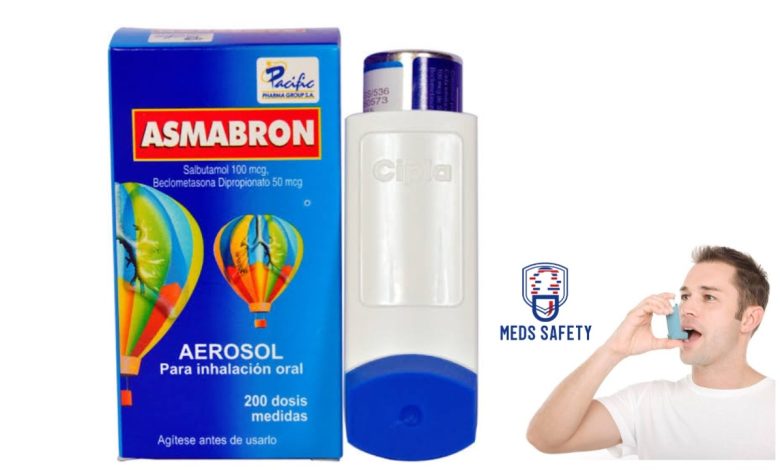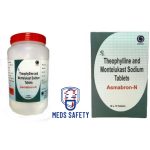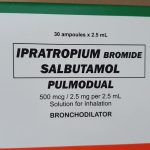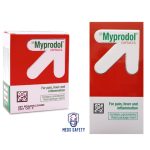Asmabron Aerosol: Uses, Benefits, Dosage, Side Effects, Interactions

What is Asmabron Aerosol?
Asmabron Aerosol is an inhaler that contains two active ingredients; Salbutamol 100mcg and Beclomethasone 50mcg primarily used to relieve bronchoconstriction in conditions like asthma, COPD, and bronchitis.
Respiratory conditions such as asthma, chronic obstructive pulmonary disease (COPD), and bronchitis can be challenging to manage, especially when symptoms like bronchoconstriction, wheezing, and shortness of breath strike. Asmabron Aerosol with two active ingredients – Salbutamol and Beclomethasone – is formulated to provide faster and more effective relief.
How it works
Salbutamol, also known as Albuterol, is a bronchodilator and the first active ingredient in Asmabron Aerosol. It plays a pivotal role in offering immediate relief to individuals experiencing acute symptoms of respiratory distress.
Salbutamol is highly effective in relieving bronchoconstriction, a hallmark symptom of conditions like asthma and bronchitis. When the airways in the lungs constrict, breathing becomes laborious and wheezing ensues. Salbutamol rapidly acts to relax the muscles encircling these airways, thereby opening them up and facilitating easier breathing.
When it comes to managing acute symptoms, speed is of the essence. Salbutamol stands out for its rapid onset of action. This makes it an invaluable tool during asthma attacks, as it swiftly alleviates wheezing, shortness of breath, and other distressing symptoms. By relaxing the smooth muscles surrounding the airways, Salbutamol not only offers immediate relief but also promotes enhanced airflow. This improvement in airflow ensures better oxygen exchange and more comfortable breathing, significantly enhancing the quality of life for individuals with respiratory conditions.
The second active ingredient, Beclomethasone, adds a layer of comprehensive and long-term management to Asmabron Aerosol. Beclomethasone plays a crucial role in controlling and preventing inflammation in the airways. Inflammation is a core contributor to the symptoms experienced in conditions like asthma. By reducing this inflammation, Beclomethasone helps prevent the recurrence of asthma attacks.
Beclomethasone is a maintenance medication that ensures the long-term control of respiratory conditions. By taking it regularly, individuals can minimize the frequency and severity of asthma attacks, ultimately reducing their reliance on quick-relief medications like Salbutamol.
Through its anti-inflammatory properties, Beclomethasone also minimizes symptoms such as coughing, wheezing, and shortness of breath. This translates to improved quality of life and fewer disruptions due to respiratory distress.
Dosage
Use Asmabron Aerosol exactly as prescribed by your doctor, to ensure that you receive the most effective and safe treatment. Asmabron Aerosol is a prescription medication, and the dosage is tailored to the specific needs of each patient. Your healthcare provider will carefully assess your medical condition, the severity of your respiratory condition, and your overall health before determining the appropriate dosage. It’s important to follow their instructions meticulously.
To ensure the effectiveness of your treatment, it’s vital to comply with your prescribed dosage. Consistency in using Asmabron Aerosol, especially for maintenance, is key to managing your condition successfully. Your healthcare provider may also monitor your progress, make necessary adjustments to your dosage, and provide guidance on the timing and technique of inhaler use.
Side Effects of Asmabron Aerosol
When it comes to managing respiratory conditions with Asmabron Aerosol, it’s essential to be aware of potential side effects. These side effects can vary in intensity and occurrence. It’s important to understand what to expect and how to manage them effectively. Here’s a closer look at the side effects associated with Asmabron Aerosol:
Common Side Effects:
1. Sore Throat: One of the common side effects of Asmabron Aerosol is a sore throat. This irritation or discomfort in the throat can occur due to the medication’s impact on the throat’s sensitive tissues. It’s usually a mild and temporary side effect.
2. Coughing: Some individuals using Asmabron Aerosol may experience an increase in coughing. This can be due to the medication’s effect on airway smooth muscles or irritation in the throat. This cough is often transient and tends to subside over time.
3. Hoarseness: Hoarseness refers to a change in the voice, making it sound rough or strained. It may occur as a result of the aerosol’s impact on the vocal cords. This side effect is typically mild and temporary.
Less Common Side Effects:
1. Oral Thrush: In some cases, individuals using Beclomethasone, one of the active ingredients in Asmabron Aerosol, may experience oral thrush. This fungal infection in the mouth can cause white patches on the tongue and inside the cheeks. It is important to inform your healthcare provider if you notice any signs of oral thrush, as it may require treatment.
2. Increased Risk of Mouth Infections: Beclomethasone can also slightly increase the risk of mouth infections in some individuals. It’s essential to maintain good oral hygiene and promptly address any signs of infection, such as mouth sores or discomfort.
Interactions
Asmabron Aerosol can interact with other medications, potentially impacting their effectiveness or causing adverse reactions. It is crucial to discuss your full medication list with your healthcare provider to ensure there are no significant interactions. Here are a few points to consider regarding interactions:
• Other Inhalers: If you are using other inhalers for different medications or conditions, inform your healthcare provider. They can provide guidance on the appropriate timing and usage of multiple inhalers to avoid potential interactions.
• Oral Corticosteroids: If you are prescribed oral corticosteroids for severe asthma or other conditions, this may increase the risk of systemic side effects when combined with Beclomethasone. Your healthcare provider will closely monitor your treatment and adjust your medication as needed.
• Oral Antifungal Medications: If oral thrush develops, your healthcare provider may prescribe antifungal medications. Be sure to inform them of any other medications you are taking to avoid potential interactions.
Manufacturer: South American Express SA, Bolivia





